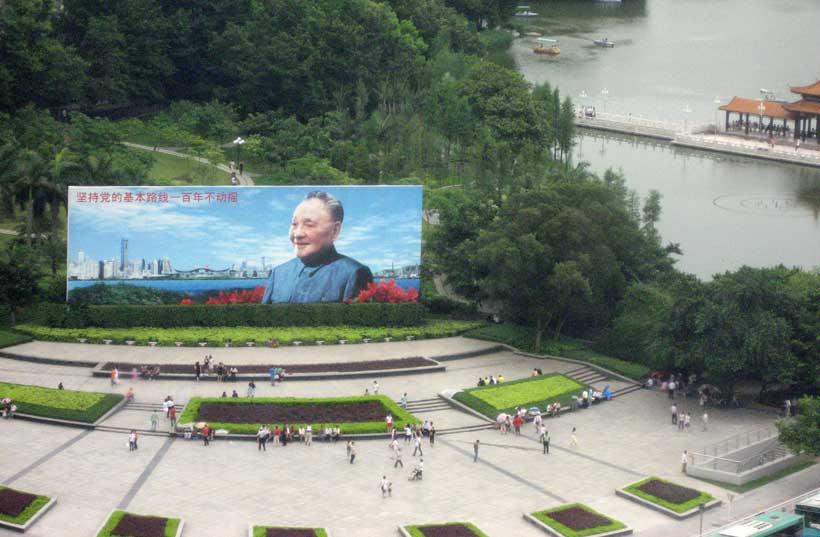Therefore, Comrade “Xi Jinping”, as the leader of modern China, was keen to continue the approach of his predecessor, “Deng Xiaoping”, and even surpass him, especially internally, through his keenness to achieve the well-being of his people and make the people the masters of the country. President “Xi” followed several standards to achieve well-being and make his people in the first place, in addition to paying attention to the interests of the poor classes and lower middle-income classes, especially in remote areas and less developed regions, and working continuously to improve their living conditions, raising the level of social and health care for them, improving their housing and work conditions, and the success of the president”. President “Xi” and the leaders of the ruling Communist Party to completely eradicate extreme poverty in the country. But on the other hand, the poor classes in advanced capitalist countries are still getting poorer, with no significant improvement in their living and economic conditions, and the lack of adequate health insurance coverage for them. The United States is governed by one percent of its population, by politicians belonging to that one percent class, and most of their policies serve the interests of the one percent class to which they belong. Hence, the United Nations Human Rights Council in Geneva has become a battleground and competition between the interests, ideas, and values of Western countries and China.
Here we find that President “Xi” has surpassed “Deng Xiaoping” in terms of interest in the interior, since at a time when the United States of America and Western countries claim to talk about their democratic systems and glorify human rights values, those same countries do not recognize their poor and deprived classes. The right to education and health, which contradicts the way China deals with all categories of its people. China also always actively participates in the field of (global human rights governance), by promoting international dialogue and cooperation in the field of human rights, while calling for giving equal attention to various human rights and promoting them in a balanced manner, which contributes to accelerating the implementation of economic, social and cultural rights and the right to Development, in contrast to the prevailing trend in the United States of America and the West of depriving certain parties of a number of rights while distinguishing between their citizens.
In this context, China believes that the approach to human rights must be comprehensive and integrated. It does not discriminate, for example, between its Chinese citizens who have dark skin like others, nor does it send its armies to destroy countries, as the United States of America did in Iraq and Libya, or to steal the capabilities of peoples, as is happening today in Syria and elsewhere, or to impose inhumane sanctions on peaceful peoples, as is the case in (Yemen, Venezuela, or Cuba). China did not establish its state through genocide and major massacres against indigenous citizens, like the United States of America, and it did not kidnap free people from their homes. Other continents to bring them by force, bound by chains and shackles, to become their slaves, bought and sold in slave markets, and it did not set itself up as a policeman over the world, or a moral preacher, dictating to other countries what they may and may not do.
In his international speeches, Chinese President “Xi Jinping” shows his constant readiness to work with all parties in order to continually strive towards the noble goal of “human rights for all”. Hence, China is constantly keen to develop its own concept of (full-fledged popular democracy), which allows its citizens to manage state affairs through various means and forms in accordance with legal provisions. China is also keen to support and protect the culture of human rights through its legislation, law enforcement, judiciary, and compliance with regulations. At the same time, it protects the freedom of religious belief of citizens in accordance with legal provisions, and promotes harmonious coexistence between different religions. Hence, the Chinese have become proud and proud of their development results, and consider their numbers as a slap in the face of the United States of America and the West, after their long exploitation of the capabilities of the people, and draining the minds of the people of developing countries, while imposing unjust and unjust sanctions against others, and distorting the reputation of countries whose policies are not in line with the American and Western approach.
Based on our previous understanding of the Chinese approach to democracy and human rights during the era of Chinese President “Xi Jinping”, the Chinese interests in spreading its culture of human rights internationally came through China’s publication of what is known as the “White Paper” on “human rights”, refuting and clarifying the most important criteria and its own experience and standards in human rights, mentioning that its pride of the Chinese achievements in raising the standard of living of her citizens, to a prosperous society, and hopes for the rest of the people around the world, including the citizens of the United States of America and the West itself. Hence, China presents its own vision of this term, the definition of which the West has monopolized, regarding the meaning of (freedom and democracy) from the Western perspective, placing at the top of the list several other priorities, and a vision that contradicts this approach and the Western concept of democracy and human rights. Accordingly, we understand these proactive steps by President “Xi Jinping” to strengthen the socialist culture in the new era, outperforming his predecessor “Deng Xiaoping”.
